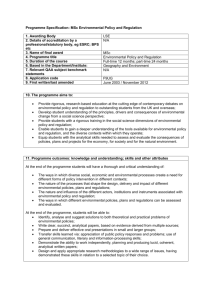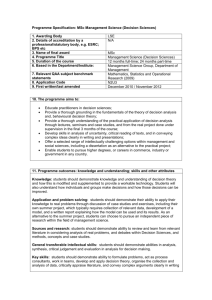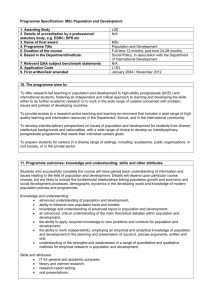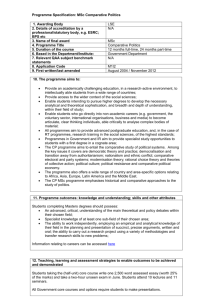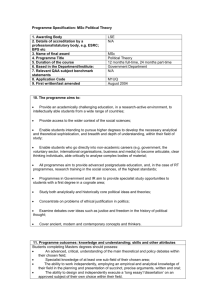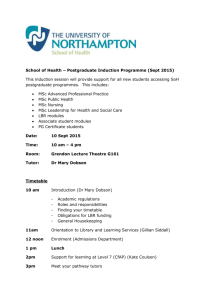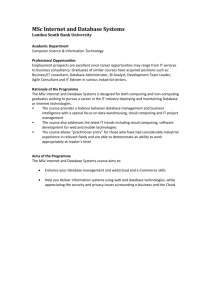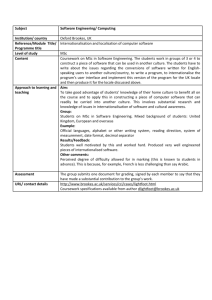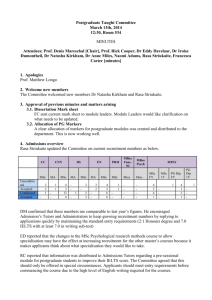Programme Specification: MSc Public Policy & Administration
advertisement
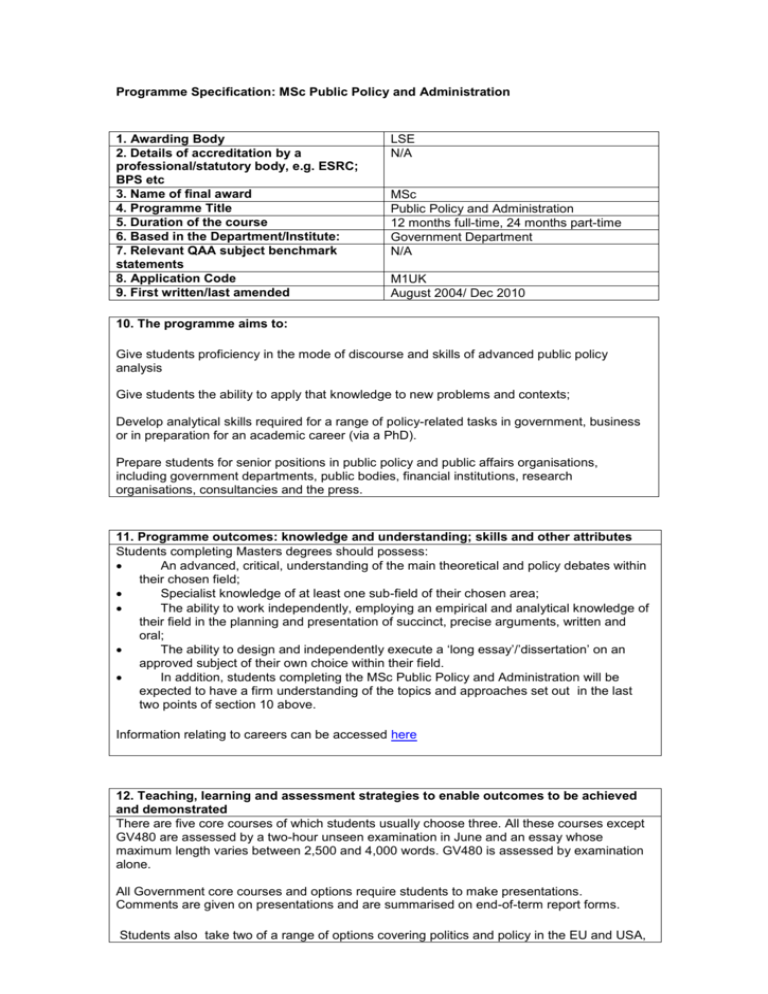
Programme Specification: MSc Public Policy and Administration 1. Awarding Body 2. Details of accreditation by a professional/statutory body, e.g. ESRC; BPS etc 3. Name of final award 4. Programme Title 5. Duration of the course 6. Based in the Department/Institute: 7. Relevant QAA subject benchmark statements 8. Application Code 9. First written/last amended LSE N/A MSc Public Policy and Administration 12 months full-time, 24 months part-time Government Department N/A M1UK August 2004/ Dec 2010 10. The programme aims to: Give students proficiency in the mode of discourse and skills of advanced public policy analysis Give students the ability to apply that knowledge to new problems and contexts; Develop analytical skills required for a range of policy-related tasks in government, business or in preparation for an academic career (via a PhD). Prepare students for senior positions in public policy and public affairs organisations, including government departments, public bodies, financial institutions, research organisations, consultancies and the press. 11. Programme outcomes: knowledge and understanding; skills and other attributes Students completing Masters degrees should possess: An advanced, critical, understanding of the main theoretical and policy debates within their chosen field; Specialist knowledge of at least one sub-field of their chosen area; The ability to work independently, employing an empirical and analytical knowledge of their field in the planning and presentation of succinct, precise arguments, written and oral; The ability to design and independently execute a ‘long essay’/’dissertation’ on an approved subject of their own choice within their field. In addition, students completing the MSc Public Policy and Administration will be expected to have a firm understanding of the topics and approaches set out in the last two points of section 10 above. Information relating to careers can be accessed here 12. Teaching, learning and assessment strategies to enable outcomes to be achieved and demonstrated There are five core courses of which students usually choose three. All these courses except GV480 are assessed by a two-hour unseen examination in June and an essay whose maximum length varies between 2,500 and 4,000 words. GV480 is assessed by examination alone. All Government core courses and options require students to make presentations. Comments are given on presentations and are summarised on end-of-term report forms. Students also take two of a range of options covering politics and policy in the EU and USA, network regulation, and different aspects and areas of development. All students take a 10,000 word dissertation designed to test their ability to do a high-quality piece of independent research and analysis over the summer. All students have personal tutors whose main role is: to guide students' choice of suitable options: to help where requested with advice on essays for the core course; to act as advisor and watchdog on the student's overall academic performance, as well as first port of call when the student has academic or personal problems to discuss; most significantly, to help the student to choose a suitable topic for the dissertation, and to ensure that the student by the end of the summer term has a topic which fits the MSc's remit and can be completed with the resources and within the time available. 13. Programme structures and requirements, levels, modules and awards See the MSc Public Policy and Administration programme regulations Additional information 14. Criteria for admission to the programme A first or upper second class honours (2;1) degree of a UK university or equivalent in a subject appropriate to the programme to be followed. Most graduate programmes assume that the student will have prior knowledge to degree level in particular disciplines. Competition varies between programmes and the level of grades/marks required will vary. For most programmes students will need a first class honours degree or its equivalent. Students who are taking or have taken a recognised degree programme outside the UK will need to have obtained, or expect to obtain, at least 70 per cent of the available marks in their final year examinations. If their country uses the cumulative Grade Point Average (GPA) system they should have normally obtained, or expect to obtain, a GPA of at least 3.5 (out of 4) or above. 15. Indicators of quality 1.High demand for the programme, and high qualifications required for admission. 2.The high fees paid by students taking the programme. 3.Consistently good examination results and very favourable remarks by external examiners. 4.Student questionnaires and feedback via staff-student liaison committees. 5. The LSE Careers Centre website provides data on career destinations of LSE graduates. 16. Methods for evaluating and improving the quality and standard of teaching and learning MSc Convenors’ Meeting which raises teaching issues and reviews regulations and assessment methods. 2 per year. MSc Student Representatives Meetings. 2 per year. MSc Student Meetings. 1 per year per programme. Postgraduate Teaching Review. 5 yearly cycle per programme. TQARO Student Surveys. 1 per module. The Teaching and Learning Centre is available to monitor and observe teaching and offers constructive advice on how to improve the standard of teaching and quality. The Teaching Learning and Assessment Committee which regulates all aspects of teaching quality; Departmental TLAC review once every five years. The Graduate Studies Sub-Committee which oversees all graduate programmes and ensures that significant changes to programmes and courses pass through a sequence of formal stages, so that curricular changes are appropriate and compatible with other developments. 10. The programme aims to: Give students proficiency in the mode of discourse and skills of advanced public policy analysis Give students the ability to apply that knowledge to new problems and contexts; Develop analytical skills required for a range of policy-related tasks in government, business or in preparation for an academic career (via a PhD). Prepare students for senior positions in public policy and public affairs organisations, including government departments, public bodies, financial institutions, research organisations, consultancies and the press. 11. Programme outcomes: knowledge and understanding; skills and other attributes Students completing Masters degrees should possess: An advanced, critical, understanding of the main theoretical and policy debates within their chosen field; Specialist knowledge of at least one sub-field of their chosen area; The ability to work independently, employing an empirical and analytical knowledge of their field in the planning and presentation of succinct, precise arguments, written and oral; The ability to design and independently execute a ‘long essay’/’dissertation’ on an approved subject of their own choice within their field. In addition, students completing the MSc Public Policy and Administration will be expected to have a firm understanding of the topics and approaches set out in the last two points of section 10 above. Information relating to careers can be accessed here 12. Teaching, learning and assessment strategies to enable outcomes to be achieved and demonstrated There are five core courses of which students usually choose three. All these courses except GV480 are assessed by a two-hour unseen examination in June and an essay whose maximum length varies between 2,500 and 4,000 words. GV480 is assessed by examination alone. All Government core courses and options require students to make presentations. Comments are given on presentations and are summarised on end-of-term report forms. Students also take two of a range of options covering politics and policy in the EU and USA, network regulation, and different aspects and areas of development. All students take a 10,000 word dissertation designed to test their ability to do a high-quality piece of independent research and analysis over the summer. All students have personal tutors whose main role is: to guide students' choice of suitable options: to help where requested with advice on essays for the core course; to act as advisor and watchdog on the student's overall academic performance, as well as first port of call when the student has academic or personal problems to discuss; most significantly, to help the student to choose a suitable topic for the dissertation, and to ensure that the student by the end of the summer term has a topic which fits the MSc's remit and can be completed with the resources and within the time available. 13. Programme structures and requirements, levels, modules and awards Programme regulations can be accessed here Additional information 14. Criteria for admission to the programme A first or upper second class honours (2;1) degree of a UK university or equivalent in a subject appropriate to the programme to be followed. Most graduate programmes assume that the student will have prior knowledge to degree level in particular disciplines. Competition varies between programmes and the level of grades/marks required will vary. For most programmes students will need a first class honours degree or its equivalent. Students who are taking or have taken a recognised degree programme outside the UK will need to have obtained, or expect to obtain, at least 70 per cent of the available marks in their final year examinations. If their country uses the cumulative Grade Point Average (GPA) system they should have normally obtained, or expect to obtain, a GPA of at least 3.5 (out of 4) or above. 15. Indicators of quality 1.High demand for the programme, and high qualifications required for admission. 2.The high fees paid by students taking the programme. 3.Consistently good examination results and very favourable remarks by external examiners. 4.Student questionnaires and feedback via staff-student liaison committees. 5. The LSE Careers Centre website provides data on career destinations of LSE graduates. 16. Methods for evaluating and improving the quality and standard of teaching and learning MSc Convenors’ Meeting which raises teaching issues and reviews regulations and assessment methods. 2 per year. MSc Student Representatives Meetings. 2 per year. MSc Student Meetings. 1 per year per programme. Postgraduate Teaching Review. 5 yearly cycle per programme. TQARO Student Surveys. 1 per module. The Teaching and Learning Centre is available to monitor and observe teaching and offers constructive advice on how to improve the standard of teaching and quality. The Teaching Learning and Assessment Committee which regulates all aspects of teaching quality; Departmental TLAC review once every five years. The Graduate Studies Sub-Committee which oversees all graduate programmes and ensures that significant changes to programmes and courses pass through a sequence of formal stages, so that curricular changes are appropriate and compatible with other developments.
